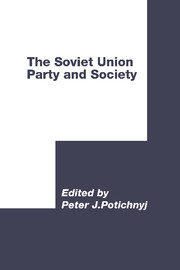Book contents
Preface by P. J. Potichnyj
Published online by Cambridge University Press: 04 August 2010
Summary
The essays presented here were originally prepared for delivery at the Third World Congress for Soviet and East European Studies in Washington, DC, in the fall of 1985. They touch on various aspects of Soviet domestic politics.
One of the most significant developments in the USSR in the early 1980s has been the extent to which the Soviet political and economic system had to adjust to the requirements and demands of the present-day world.
In Western literature the period after the death of Brezhnev is quite often referred to as the transition period or simply as the period of modernization, in which an attempt is made to adapt traditional principles, such as integrated economic and social planning and centralized political control, to drastically changing scientific–technical and socioeconomic conditions. This process of change is particularly marked in the political sphere, characterized by rejuvenation among the Soviet elite and political cadres. But by no means is it limited to the political elite.
Special interests are well entrenched in many party and state organizations in the center, as well as in the localities. These bureaucratic interests are engaged in competition and debate over the structure, operation and performance of the Soviet economy and society.
Some of the ongoing adjustments in the system are therefore preceded by an extensive discussion in various Soviet publications and involve not only the party and government officials but also, depending on circumstances, a varying and continuously growing number of specialists.
- Type
- Chapter
- Information
- The Soviet Union: Party and Society , pp. xiii - xviiiPublisher: Cambridge University PressPrint publication year: 1988



